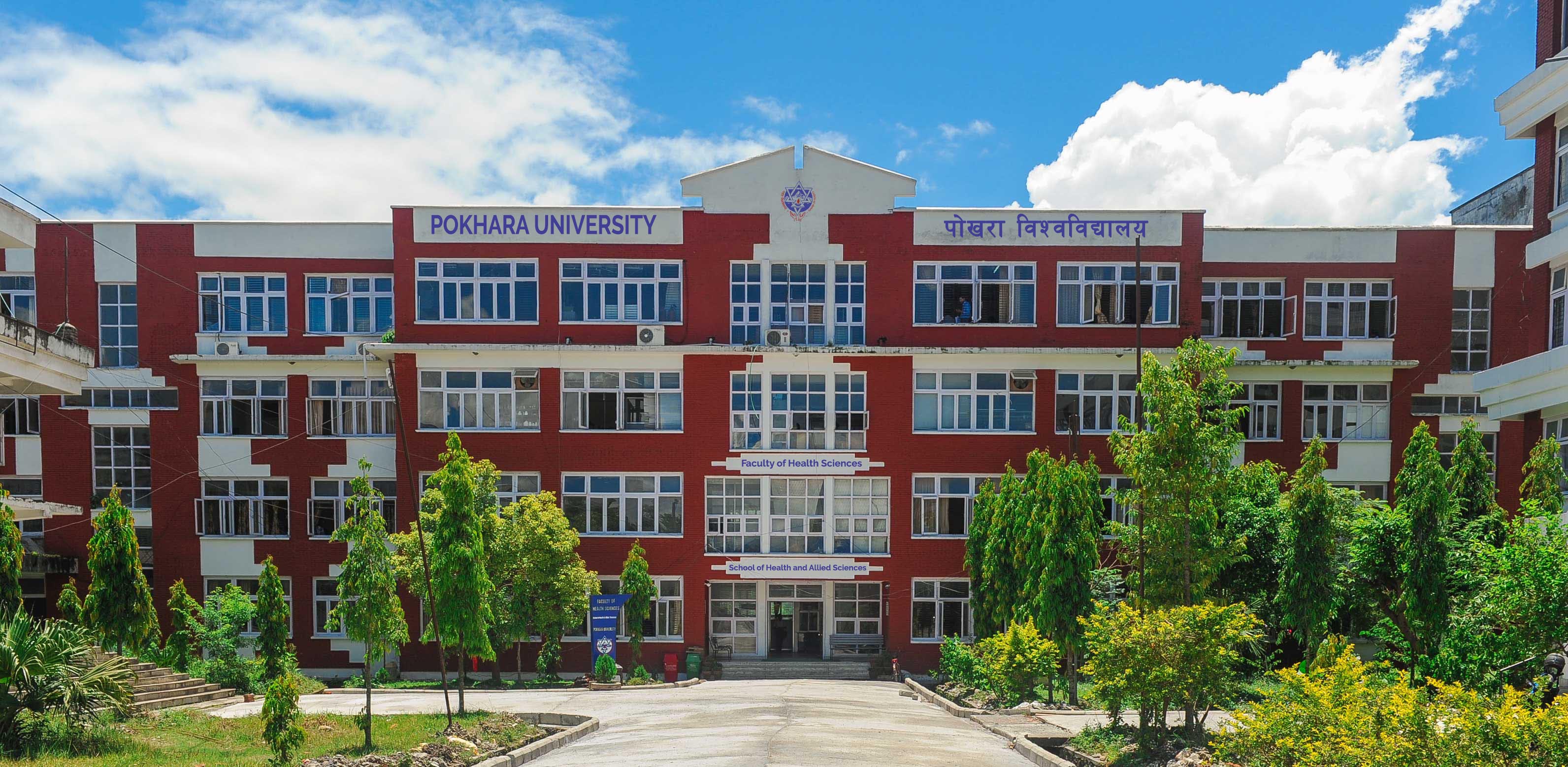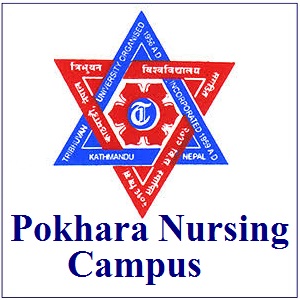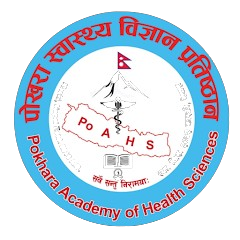Overview
The School of Health and Allied Sciences is a constituent school of Pokhara University, established in 1997, with the vision of producing skilled and qualified human resources in the field of medical and paramedical sciences.
Over the years, the school has established itself as a leading center of excellence, offering high-quality education in various disciplines.
History
The School of Pharmaceutical Sciences at Pokhara University was established in 2001, offering a Bachelor of Pharmaceutical Sciences (B.Pharm) degree. Program at its Nayabazar Pokhara Campus.
Later in 2003, the school relocated to the Shwet Bhavan campus at Simalchaur, and its name was changed to the School of Pharmaceutical and Biomedical Sciences, marking the introduction of Medical Laboratory Technology studies.
In 2005, the MPharm program in Natural Products Chemistry and Pharmaceutics was introduced at the school, but it was only offered for a single batch until it resumed in 2011.
Finally, in 2007, the School was relocated to its current location at Dhungepatn, and its name was officially changed to the School of Health and Allied Sciences following the introduction of Public Health and Nursing Courses.
Undergraduate Programs
Currently, the School of Health and Allied Sciences offers five undergraduate programs: Pharmaceutical Sciences, Medical Laboratory Sciences, Public Health, Nursing, and Physiotherapy.
These programs are designed to equip students with the necessary knowledge and skills required for a successful career in the medical and paramedical field.
Master-Level Programs
Apart from undergraduate programs, the school also offers six master-level programs, including MSc in Clinical Pharmacy, MSc in Medical Microbiology, MSc in Nursing, MSc in Pharmaceutical Analysis, MSc in Public Health, and MSc in Natural Products Chemistry.

Pioneers of Pharmaceutical Education
The pioneers of Pharmaceutical education at Pokhara University were Prof Purusotam Basnet and Prof Natasha Skalko-Basnet. Prof Purusotam Basnet served as the program director (2001-2004) of the school and later as the dean (2004-2008), while Prof Natasha Skalko-Basnet served as the program director (2004-2008) of the school.
The School of Health and Allied Sciences, with its excellent faculty, state-of-the-art infrastructure, and innovative teaching methods, is committed to providing high-quality education in medical and paramedical sciences.
The school's focus on research and practical training ensures that students are well-prepared to tackle real-world challenges and make meaningful contributions to the healthcare industry.
Mission
Pokhara University aims to develop as a center of excellence for higher education by excelling in teaching and learning, research and publication, and outreach activities.
The university strives to produce job market-oriented, responsible, productive, service-oriented, and committed human resources to contribute to the national development process. The university also aims to link the university system with community services.
Goal and Objectives
The university has set out to achieve its goal and objectives through various means, including:
-
Extending programs to unveil the strength of learners
-
Developing highly equipped labs to enhance education and experimentation
-
Preparing creative and research-oriented scientists in the field of basic and applied sciences
-
Producing well-qualified and skilled graduates to fulfill national and international demand
Salient Features:
A Sound and Peaceful Learning Environment
Pokhara University has several salient features that make it stand out from other universities in Nepal, including:
-
A sound and peaceful learning environment
-
Extensive and unlimited use of technology in the teaching-learning process with high-speed internet
-
Updated variety of teaching-learning methods
-
In-course seminars, fully equipped laboratories, and community exposure
-
National and international conferences and symposia
-
High academic records and a glorious public record
-
Professional, highly dedicated research and result-oriented faculty with strong backgrounds carrying extensive technical experience and high academic achievements
-
Extensive feasible programs were designed and developed under the national strategy and priority of the government of Nepal.
Admission Procedure:
The admission procedure at the School of Health and Allied Sciences is designed to select highly motivated and deserving candidates who meet the minimum eligibility criteria for the respective courses. Here are the steps involved in the admission procedure:
Eligibility Assessment
Candidates applying for undergraduate or master-level programs are required to meet the minimum eligibility criteria for the respective courses.
The eligibility criteria may vary for different programs, and candidates are advised to check them before applying.
National Entrance Examination
Eligible candidates are required to appear for the national entrance examination held by the Medical Education Commission, Government of Nepal.
The entrance examination evaluates the knowledge and aptitude of the candidates in the relevant subjects.
Application Process
Candidates who successfully clear the national entrance examination are required to apply for the respective programs in the School of Health and Allied Sciences.
The application process typically involves completing an online or offline application form, submitting academic transcripts, and providing other relevant documents.
Merit-Based Selection
The selection of candidates for admission is based on the merit order of the candidates in the defined seats. The merit order is determined based on the scores obtained in the national entrance examination and other relevant criteria.
Candidates who score higher in the entrance examination and fulfill other admission criteria have a better chance of getting admission to the School.
Admission Confirmation
Candidates who are selected for admission are required to confirm their admission by paying the required fees and completing other formalities.
The admission confirmation process may involve submitting original documents and completing medical examinations.
Courses Offered:
- BSc Medical Laboratory Technology (BSCMLT): This program focuses on preparing students to work as medical laboratory technologists in clinical, research, and public health laboratories. Students will learn about laboratory tests, equipment, and techniques used in the diagnosis, treatment, and prevention of diseases.
- Bachelor of Public Health (BPH): This program is designed to equip students with the knowledge and skills necessary in the areas of public health, epidemiology, health promotion, and disease prevention. Students will learn about health systems, policies, and interventions aimed at improving the health of populations.
- BSc Nursing: This program prepares students to become registered nurses who can provide high-quality care to patients in various healthcare settings. Students will learn about anatomy, physiology, pharmacology, nursing theories, and clinical practices to develop their nursing skills.
- Master of Pharmacy (M.Pharm): This program is designed to provide students with advanced knowledge and skills in the field of pharmacy. Students will learn about drug design, drug development, drug delivery, and drug therapy management.
- Master of Public Health (MPH): This program is designed to equip students with the knowledge and skills to work in public health, community health, and global health. Students will learn about epidemiology, biostatistics, environmental health, health policy, and health promotion.
- Bachelor of Nursing Science in Oncology: This program prepares students to become specialized oncology nurses. Students will learn about the biology of cancer, cancer treatment, symptom management, and patient care in oncology settings.
- MSc in Medical Biochemistry: This program provides students with advanced knowledge and skills in the area of medical biochemistry. Students will learn about biochemical processes in health and disease, molecular biology, and laboratory techniques used in biochemical research.
- MSc in Medical Microbiology: This program is designed to equip students with advanced knowledge and skills in the field of medical microbiology. Students will learn about microorganisms, infectious diseases, antimicrobial resistance, and laboratory techniques used in microbiological research.
- Bachelor of Physiotherapy (BPT): This program prepares students to become licensed physiotherapists who can provide rehabilitation services to patients with physical impairments or disabilities. Students will learn about anatomy, physiology, kinesiology, and rehabilitation techniques.
- Bachelor of Pharmacy (B Pharm): This program is designed to prepare students for a career in the pharmaceutical industry, community pharmacy, or hospital pharmacy. Students will learn about drug development, drug delivery, pharmacology, and pharmacy practice.
Contact the administrative office of the Pokhara University School of Health and Allied Sciences for detailed information on the course, admissions, location, fees, scholarships, facilities, counseling, or eligibility requirements.



.png)















You need to login to comment.